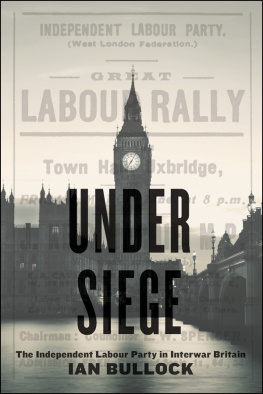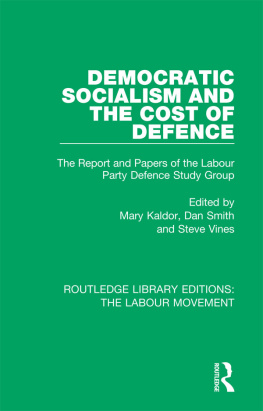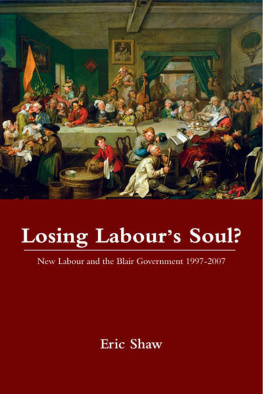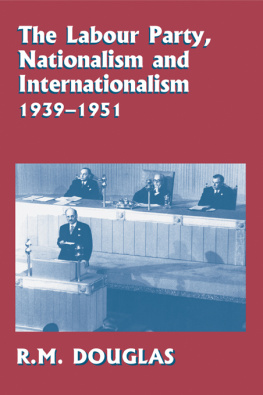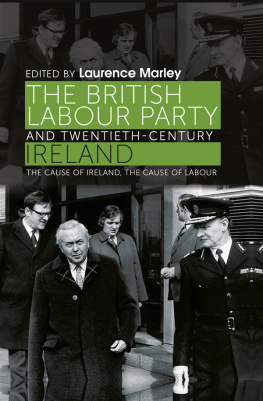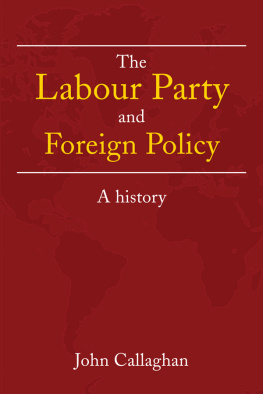UNDER
SIEGE
UNDER
SIEGE
The Independent Labour Party in Interwar Britain
Ian Bullock
Copyright 2017 Ian Bullock
Published by AU Press, Athabasca University
1200, 10011 109 Street, Edmonton, AB T5J 3S8
ISBN 978-1-77199-155-1 (pbk.) ISBN 978-1-77199-156-8 (pdf)
ISBN 978-1-77199-157-5 (epub) DOI : 10.15215/aupress/9781771991551.01
Cover design by Marvin Harder, marvinharder.com
Interior design by Sergiy Kozakov
Printed and bound in Canada by Marquis Book Printers
Library and Archives Canada Cataloguing in Publication
Bullock, Ian, 1941-, author
Under siege : the Independent Labour Party in interwar Britain / Ian Bullock.
Includes bibliographical references and index.
Issued in print and electronic formats.
1. Independent Labour Party (Great Britain)History20th century. 2. Political partiesGreat Britain--History20th century. 3. Great BritainPolitics and government1910-1936. I. Title.
JN 1129. I 52 B 85 2017 324.241097 C 2017-902958-4
C 2017-902959-2
Athabasca University Press acknowledges the assistance provided by the Government of Alberta, Alberta Media Fund.
Please contact AU Press, Athabasca University at for permissions and copyright information.
For Sue,
Chloe and Paul (and Tigerlily),
James, Rob, and Andrew
And in memory of my greatly missed friends
Andy Durr, John Gurney, and Fred Herbert
The word Revolution is as ambiguous and deceptive as it is necessary.
John Middleton Murry, draft of an address
delivered at the ILP s summer school, August 1932
Contents
Abbreviations
BSP | British Socialist Party |
CPGB | Communist Party of Great Britain |
IBRSU | International Bureau for Revolutionary Socialist Unity |
IE | Inner Executive |
ILP | Independent Labour Party |
ISP | Independent Socialist Party |
NAC | National Administrative Council |
NEC | National Executive Committee |
PLP | Parliamentary Labour Party |
POUM | Partido Obrero de Unificacin Marxista |
RPC | Revolutionary Policy Committee |
SDF | Social-Democratic Federation |
SL | Socialist League |
SLP | Socialist Labour Party |
SSIP | Society for Socialist Inquiry and Propaganda |
SSP | Scottish Socialist Party |
TUC | Trades Union Congress |
UDC | Union of Democratic Control |
Acknowledgements
I am grateful for a British Academy grant that helped to fund frequent expeditions to the British Library of Political and Economic Science, at the London School of Economic and Political Science, and to the British Library at St. Pancras and its newspaper collection, then at Colindale, as well as research trips to Manchester and Edinburgh. Thanks also to Amelia Wakeford, research development officer at the University of Sussex, for her help in securing the grant, and to Paul Grant, research grant administrator.
Thanks are due to the librarians at the institutions already mentioned, to the Peoples History Museum, Manchester, and especially to Sue Donnelly, Anna Townslon, Elinor Robinson, and Catherine MacIntyre, archivists at the British Library of Political and Economic Science; to Rona Morrison, at the Centre for Research Collections, University of Edinburgh Library; to Lynette Cawthra, at the Working Class History Museum, Salford; to Kirsty Meehan, of the National Galleries of Scotland; and to Antony Penrose.
I am grateful to my friends Peter France, Sin Reynolds, and Marilyn and Tony Carew for their hospitality during research trips. For initial advice, guidance, and encouragement, I am indebted to Logie Barrow, Tony Carew, Gidon Cohen, Alvin Finkel, Kevin Morgan, Dennis Pilon, and Victor Rabinovitch. In the later stages of the project, I was greatly helped by the dedicated and expert editing of Joyce Hildebrand and, especially, Pamela Holway, at AU Press.
Barry Winter and Sue Bullock both spent long hours reading each chapter in draft and making vital comments. Barry was particularly diligent in discouraging my tendency to write sentences of Proustian length. As ever, Sue played an indispensable part in keeping me sane and (mostly) cheerful throughout what proved to be a lengthy project. I cannot thank her enough.

Introduction
She had heard someone say something about an Independent Labour Party, and was furious she had not been asked. So wrote Evelyn Waugh of his character Agatha Runcible, one of Britains so-called Bright Young People, whom he satirized in his novel Vile Bodies. Waugh, of course, was not known for his warm embrace of left-wing views. Yet his quip serves to remind us that in 1930, the year that Vile Bodies appeared, the ILP was a well-known actor on the political stage, having existed, at that point, for nearly forty years.
Founded in 1893, the ILP had initially pursued the Labour Alliance strategy of one of its most prominent leaders, Keir Hardie, combining with trade unions to secure parliamentary representation for the working classan initiative that culminated in 1900, with the formation of the Labour Representation Committee ( LRC ). From the start, the LRC was often referred to as the Labour Party, and this became its official title in 1906. At this stage, the Labour Party was a federation of socialist organizations and British trade unions. Among the former, the ILP was the largest, and its members accounted for many, if not most, of the local activists who held public meetings, knocked on doors, and delivered leaflets during elections. The ILP s situation would change in 1918, however, when the Labour Party adopted a new constitution. To Labours federal structure was added, for the first time, the possibility of joining the party directly, as an individual member, and contributing to the activities of one of the partys newly forming local branches. These changes challenged the traditional role of the ILP within the federation, raising, for the ILP , the urgent question of what part it should, or could, play within the new arrangement.
The founding, in 1920, of the Communist Party of Great Britain ( CPGB ) likewise altered the landscape of the British Left, and the ILP was, of course, obliged to respond to this new presence. With respect to the interwar period, historians sometimes tend to view the Labour Party and the CPGB as the only two significant forces on the British Left, with the ILP accordingly presented

